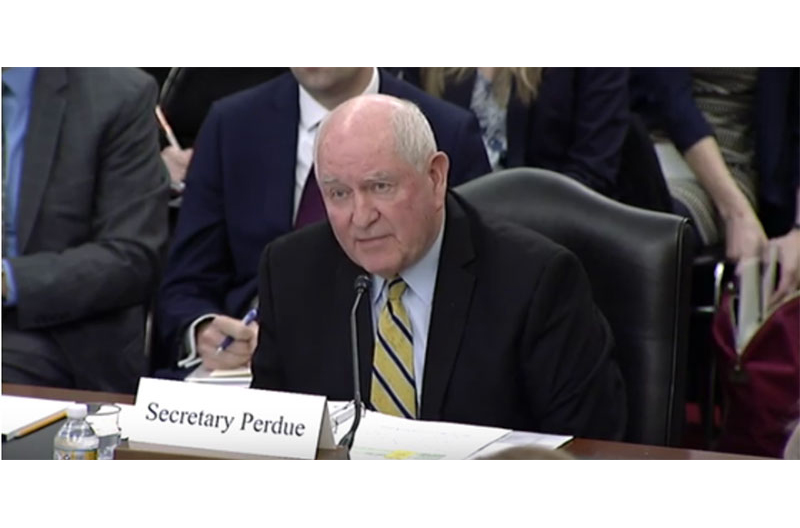U.S. Secretary of Agriculture Sonny Perdue reiterated during a U.S. Senate hearing Feb. 28 the need to restore the original intent of the Supplemental Nutrition Assistance Program (SNAP), which is to be a second chance and not a way of life.
Perdue’s comments come on the heels of the U.S. Department of Agriculture (USDA) publishing in the Federal Register a proposed rule to move more able-bodied recipients of SNAP benefits to self-sufficiency through the dignity of work. The rule aims to restore the system to what it was meant to be: assistance through difficult times, not lifelong dependency.
This proposed rule focuses on work-related program requirements for Able-Bodied Adults Without Dependents (ABAWDs) and would apply to non-disabled people, between the ages of 18 and 49, with no dependents. The rule would not apply to the elderly, the disabled or pregnant women. Those who are eligible to receive SNAP—including the underemployed—would still qualify.
Despite the absence of any statutory changes to the welfare reform legislation of 1996, an abuse of administrative flexibility in SNAP has undermined the ideal of self-sufficiency. When then President Bill Clinton signed the legislation that instituted work requirements for ABAWDs, he said, “First and foremost, it should be about moving people from welfare to work. It should impose time limits on welfare… It [work] gives structure, meaning and dignity to most of our lives.”
During the hearing, Perdue responded to questions about work requirements and his proposed rule.
“What was accepted by the U.S. Senate and passed was the same bill that’s been there since the beginning of the Welfare Reform regarding the work requirements of 20 hours per week,” he said. “And what you also passed was not a prohibition, it was no change to the fact that in one section it says that the Secretary may waive that applicability and we plan to do that for the ABAWDs. We think the purpose is to help people move to independency… We should help people when they are down but that should not be interminably.
“…You all also provided for a 12 percent cushion for states that they could use for any purpose. But, we do not believe in states where unemployment is 4 percent that ABAWDs should be able to stay on food assistance interminably,” Perdue said.
Congress implemented this work requirement in the Personal Responsibility and Work Opportunity Reconciliation Act in 1996, and allowed the Secretary, upon request from a state, to waive the work requirement for ABAWDs during times of high unemployment. The statute provides the Secretary with broad discretion to establish criteria for determining whether an area has an insufficient number of jobs and qualifies for a waiver.
The 2018 Farm Bill did not modify the discretion that Congress provided the Secretary regarding waivers of the ABAWD work requirements.
Under current SNAP statute, ABAWDs must work or participate in an employment program for at least 20 hours a week to continue to receive benefits for more than three months over a 36-month period. States also may allow volunteer activities to satisfy the work requirement. States may request to waive the time limit in areas with an unemployment rate above 10 percent or where there are “not sufficient jobs,” which current regulations primarily define as an unemployment rate 20 percent above the national average. With today’s strong economy, that could include areas with unemployment rates of under 5 percent—a rate normally considered to be full employment. December 2018 data from the Department of Labor announced that job openings reached 7.3 million and that just under 6.3 million Americans were unemployed.
USDA’s proposal would help to ensure that work provisions are waived only when necessary, encouraging states to renew their focus on helping SNAP participants find a path to self-sufficiency. In a recent letter to the nation’s governors, Perdue explained, “These waivers weaken states’ ability to move the ABAWD population to long-term self-sufficiency because they do not require ABAWDs to engage in work and work training.”
USDA continues to encourage all interested parties to provide input on the proposed rule. The comment period opened on Feb. 1 and closes on April 2.
USDA’s Food and Nutrition Service (FNS) works to reduce food insecurity and promote nutritious diets among the American people. The agency administers 15 nutrition assistance programs that leverage America’s agricultural abundance to ensure children and low-income individuals and families have nutritious food to eat. FNS also co-develops the Dietary Guidelines for Americans, which provide science-based nutrition recommendations and serve as the cornerstone of federal nutrition policy.

